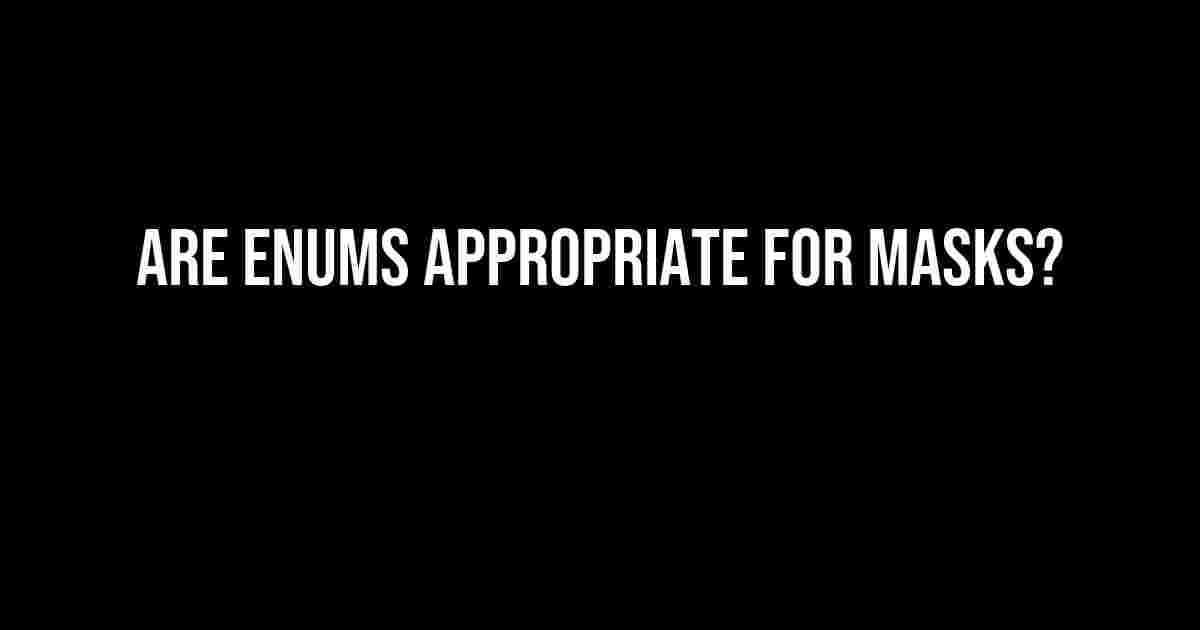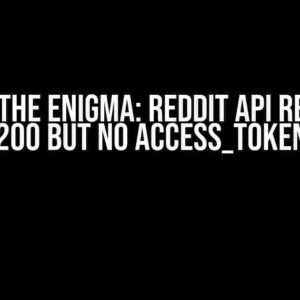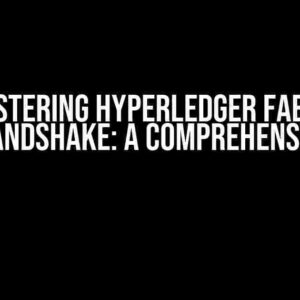Enums – the sweet, sweet taste of type safety and code readability. But can they be used effectively for masks? Well, buckle up, folks, because we’re about to dive into the world of bitmasks, flags, and, of course, enums!
What are Enums?
enums, short for enumerations, are a way to define a set of named values. You know, like a list of options, but with more awesomeness. Think of them as a collection of constants that can be used throughout your code.
enum Color {
RED,
GREEN,
BLUE
}
In this example, we’ve defined an enum called `Color` with three possible values: `RED`, `GREEN`, and `BLUE`. These values can be used in your code, making it more readable and maintainable.
What are Masks?
Masks, or bitmasks, are a way to represent a set of options using binary numbers. Yep, you read that right – binary numbers! Think of them as a compact way to store multiple boolean values in a single variable.
int permissions = 0b1010; // 10 in decimal
In this example, we’ve defined a variable `permissions` with the value `0b1010`, which represents a set of permissions. Each bit in the binary number corresponds to a specific permission. For instance, the first bit might represent “can read”, the second bit “can write”, and so on.
Why Use Enums for Masks?
So, why would we want to use enums for masks? Well, my friend, it’s quite simple:
- Enums provide type safety, ensuring that only valid values can be assigned to a variable.
- Enums are more readable than binary numbers, making your code easier to understand.
- Enums can be used with flags, allowing for more flexibility when working with masks.
enum Permissions {
NONE = 0b0000,
READ = 0b0001,
WRITE = 0b0010,
EXECUTE = 0b0100
}
int permissions = Permissions.READ | Permissions.WRITE;
In this example, we’ve defined an enum `Permissions` with four values: `NONE`, `READ`, `WRITE`, and `EXECUTE`. We’ve then used the bitwise OR operator (`|`) to combine the `READ` and `WRITE` permissions, creating a new value that represents both options.
How to Use Enums for Masks
Now that we’ve covered the basics, let’s dive into some practical examples of using enums for masks.
Defining the Enum
The first step is to define the enum with the desired values. For example:
enum Days {
MONDAY = 0b0001,
TUESDAY = 0b0010,
WEDNESDAY = 0b0100,
THURSDAY = 0b1000
}
In this example, we’ve defined an enum `Days` with four values, each representing a day of the week. The values are defined using binary numbers, where each bit corresponds to a specific day.
Using the Enum with Flags
Now that we have our enum, let’s use it with flags to create a mask:
int weekDays = Days.MONDAY | Days.TUESDAY | Days.WEDNESDAY;
In this example, we’ve used the bitwise OR operator (`|`) to combine the `MONDAY`, `TUESDAY`, and `WEDNESDAY` values, creating a new value that represents all three days.
Checking for Flags
To check if a specific flag is set, we can use the bitwise AND operator (`&`):
if (weekDays & Days.MONDAY) {
console.log("Monday is a weekday!");
}
In this example, we’ve used the bitwise AND operator (`&`) to check if the `MONDAY` flag is set in the `weekDays` variable. If it is, we log a message to the console.
Common Pitfalls
While using enums for masks can be incredibly powerful, there are some common pitfalls to watch out for:
- Enum values must be powers of 2**: Each enum value must be a power of 2 (e.g., 0b0001, 0b0010, 0b0100, etc.) to ensure that the bitwise operators work correctly.
- Avoid overlapping values**: Make sure that each enum value is unique and doesn’t overlap with other values. This can cause unexpected behavior when using flags.
- Use the correct bitwise operators**: Use the bitwise AND operator (`&`) to check for flags, and the bitwise OR operator (`|`) to combine flags.
Conclusion
So, are enums appropriate for masks? Absolutely! By using enums for masks, you can create more readable, maintainable, and type-safe code. Just remember to follow the guidelines and avoid common pitfalls, and you’ll be well on your way to bitmasking like a pro!
| Enum Value | Binary Representation |
|---|---|
| MONDAY | 0b0001 |
| TUESDAY | 0b0010 |
| WEDNESDAY | 0b0100 |
| THURSDAY | 0b1000 |
This table shows an example of an enum with four values, each represented by a unique binary number.
Additional Resources
Want to learn more about enums, masks, and flags? Check out these resources:
- MDN Web Docs – Enumerability and ownership of properties
- Stack Overflow – Use of enums in C
- Tutorialspoint – C Programming – Bitwise Operators
By following the guidelines and best practices outlined in this article, you’ll be well on your way to creating robust, maintainable, and efficient code using enums for masks.
Frequently Asked Question
Enums, masks, and the age-old question: are they a match made in heaven? Let’s dive in and find out!
Are enums inherently better for masks than other data types?
Enums are particularly well-suited for masks due to their ability to represent a set of named values. This makes it easy to define a clear and explicit set of options for your mask, ensuring that your code is readable and maintainable.
How do enums help with bitwise operations on masks?
Enums enable bitwise operations on masks by allowing you to define named values that can be combined using bitwise operators (e.g., &, |, ^). This makes it easy to create and manipulate complex masks in a straightforward and expressive way.
Can I use enums for masks in any programming language?
While enums are a fundamental concept in many programming languages, not all languages support them equally. For example, languages like C, C++, and Rust have built-in enum support, while languages like JavaScript and Python have alternative ways to achieve similar results. Research your language of choice to see how enums can be used for masks.
What are some common use cases for enums with masks?
Enums with masks are often used in scenarios where you need to represent a set of flags or options, such as file permissions, user roles, or feature toggles. They’re also useful in scenarios where you need to perform complex bitwise operations, like filtering or masking data.
Are there any performance benefits to using enums with masks?
In many cases, using enums with masks can result in performance benefits due to the efficient bitwise operations and the ability to leverage compiler optimizations. However, the specific performance benefits will depend on your language, platform, and use case, so be sure to benchmark and profile your code to see the actual impact.







